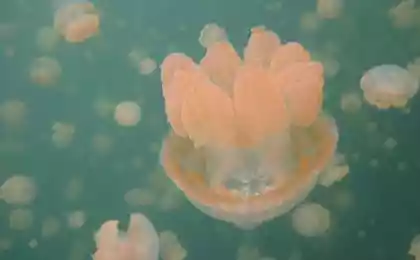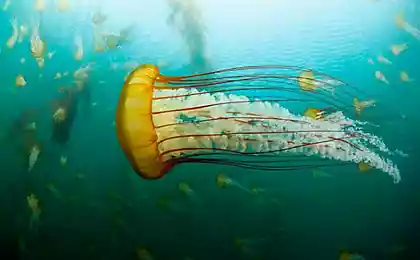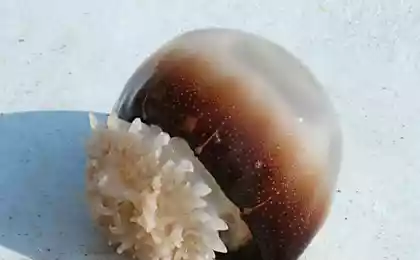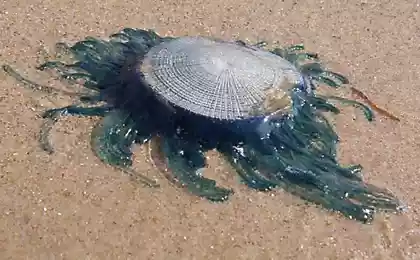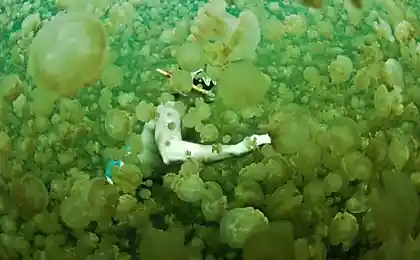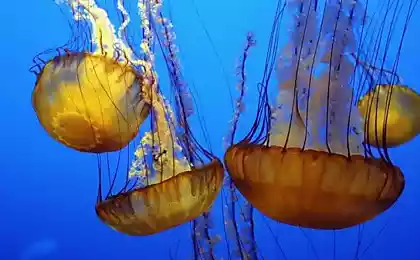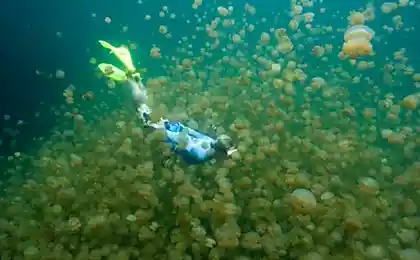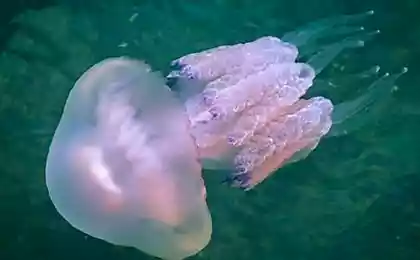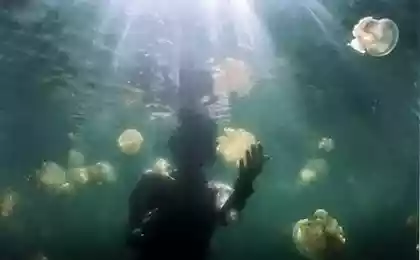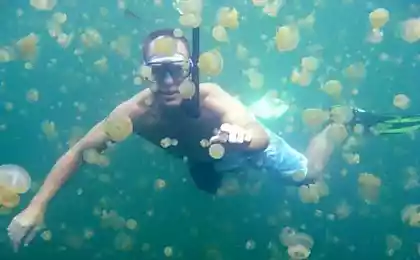206
Jellyfish diapers
Details.
Created 14.04.2014 09:05
In recent years, due to climate change, jellyfish have become increasingly louder to “state themselves”. Today, they are harder than ever to ignore on beaches and in industrial areas. Jellyfish ruthlessly sting careless swimmers and clog municipal pipelines, wrapped around the screw jamming boat engines and even, like ecologists informal, stop nuclear power plants. In general, harmless creatures are gradually becoming a problem.
Despite the inconveniences that jellyfish cause to humans, these ancient creatures have much to learn from civilized humanity. Amazing creatures frozen at the crossroads of evolution between plants and animals have neither a brain nor even a central nervous system. But they successfully move in the ocean waters and have some abilities that scientists and engineers work tirelessly to repeat.
In particular, jellyfish contain up to 90% moisture in their bodies, making them the wettest of any known creature. How do they do that? In the body of the jellyfish there are no containers in which to store water. Their body, in fact, in itself "capacity", it is like a sponge, accumulates fluid in the tissues.
Ability, as it turns out, is extremely important in our way of life. Possessing a material with similar properties, it would be easy to deal with spills of both milk on the kitchen floor and oil in the oceans.
What's the oil? Today, diapers alone produce more than 70 kilograms of waste during the first year of human life, and their popularity only increases as the benefits of civilization spread across the planet.
Researchers have tried to figure out how to adapt the amazing properties of jellyfish tissues to solve worldly problems. As a result of efforts, the Israeli startup Cine’al received a natural material hydromash (Hydromash). Dry, flexible and durable hydromash is obtained from jellyfish, which in spring and summer become a real curse for Israeli beaches.
Cine’al claims that the adsorption capacity of its material is several times higher than that of popular paper towels from television commercials.
The ability to absorb large amounts of moisture is not the only advantage of a hydromash. There are many synthetic materials in the world that work no less efficiently. But they are all made of polymers that have not decomposed in nature for centuries. Hydromash, which absorbs moisture several times its own volume, decomposes naturally within 30 days, and competes with polymers in cost.
Ofer Du-Nour, president of Cine’al, said the new product could be in demand by the Israeli government, which is spending millions of dollars to protect tourists and port waters from jellyfish. “There are too many jellyfish in the sea and too many diapers in landfills. “Cine’al can provide a definitive answer to both of these questions,” Doo-Noor said.
Facepla.net by Times of Israel
Source: facepla.net
Created 14.04.2014 09:05
In recent years, due to climate change, jellyfish have become increasingly louder to “state themselves”. Today, they are harder than ever to ignore on beaches and in industrial areas. Jellyfish ruthlessly sting careless swimmers and clog municipal pipelines, wrapped around the screw jamming boat engines and even, like ecologists informal, stop nuclear power plants. In general, harmless creatures are gradually becoming a problem.
Despite the inconveniences that jellyfish cause to humans, these ancient creatures have much to learn from civilized humanity. Amazing creatures frozen at the crossroads of evolution between plants and animals have neither a brain nor even a central nervous system. But they successfully move in the ocean waters and have some abilities that scientists and engineers work tirelessly to repeat.
In particular, jellyfish contain up to 90% moisture in their bodies, making them the wettest of any known creature. How do they do that? In the body of the jellyfish there are no containers in which to store water. Their body, in fact, in itself "capacity", it is like a sponge, accumulates fluid in the tissues.
Ability, as it turns out, is extremely important in our way of life. Possessing a material with similar properties, it would be easy to deal with spills of both milk on the kitchen floor and oil in the oceans.
What's the oil? Today, diapers alone produce more than 70 kilograms of waste during the first year of human life, and their popularity only increases as the benefits of civilization spread across the planet.
Researchers have tried to figure out how to adapt the amazing properties of jellyfish tissues to solve worldly problems. As a result of efforts, the Israeli startup Cine’al received a natural material hydromash (Hydromash). Dry, flexible and durable hydromash is obtained from jellyfish, which in spring and summer become a real curse for Israeli beaches.
Cine’al claims that the adsorption capacity of its material is several times higher than that of popular paper towels from television commercials.
The ability to absorb large amounts of moisture is not the only advantage of a hydromash. There are many synthetic materials in the world that work no less efficiently. But they are all made of polymers that have not decomposed in nature for centuries. Hydromash, which absorbs moisture several times its own volume, decomposes naturally within 30 days, and competes with polymers in cost.
Ofer Du-Nour, president of Cine’al, said the new product could be in demand by the Israeli government, which is spending millions of dollars to protect tourists and port waters from jellyfish. “There are too many jellyfish in the sea and too many diapers in landfills. “Cine’al can provide a definitive answer to both of these questions,” Doo-Noor said.
Facepla.net by Times of Israel
- Israelite
- jellyfish
- waste
- diaper
Source: facepla.net
UK plans to restrict wind farms
The immune system and the success of a person is synchronized with the balance of brain hemispheres
